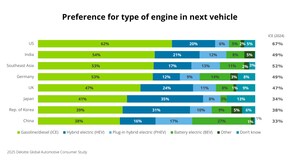Deloitte's 2016 Global Defense Outlook finds global defense postures moderating, but new "Fault Lines" emerge
-- A mere 9 of the 50 largest defense spenders have raised their commitments to defense since 2008
-- Annual defense budgets of 50 largest defense spenders projected to remain flat through 2020
-- Deloitte's new Defense Posture Index provides unique insights into national approaches to defense
NEW YORK, June 27, 2016 /PRNewswire/ -- Economic development and flat defense budgets are reducing the reliance of the world economy on defense spending, but tensions are rising along five global "fault lines," according to Deloitte's global Public Sector Defense practices' report entitled 2016 Global Defense Outlook. This report examines policies, practices and trends affecting the defense budgets and strategies of the 50 nations whose combined defense budgets total over 95% of global defense spending (the "Top 50").
In the report Deloitte also introduces its unique Defense Posture Index, a numerical ranking of national-level commitments to defense, allowing comparisons of national defense approaches and tracking of changes in national defense policies over time. Of the 10 countries with the highest Defense Posture Index scores (above 120), Russia, Israel and the United States are tied with the highest score.
Rapid, sustained economic growth combined with broad-based declines in global levels of military operations continues to transform the global defense environment. The 2016 Global Defense Outlook report makes clear that over the next five years, economic forces appear likely to continue moderating global commitments to defense, and to increase the relative parity between armed forces capabilities worldwide.
"Only nine of the fifty largest defense spenders have raised their defense posture since 2008. One of these is in Europe; the other eight are in Africa, Asia-Pacific and the Middle East," says Jack Midgley, Asia Pacific Region Public Sector Defense leader for Deloitte Global. "Some 41 countries, including the United States, Russia and China have held the line, or lowered their overall commitment to defense. Pakistan, India, Iraq and Russia maintain the highest defense postures, while Belgium, Canada, Argentina and Germany display the lowest ones among the Top 50 defense spending nations."
According to the report, the combined annual defense budget of the 50 largest defense spenders is projected to remain flat at about US$1.6 trillion through 2020. Twelve of the Top 50 nations are projected to reduce annual defense budgets by a total of $44B, paced by the projected US reduction of US$38B (2020 vs. 2016).
Sixteen of the Top 50 will increase defense budgets by more than US$1B annually, adding US$91B to the total global defense budget. China, India, South Korea, and Australia―all Asia-Pacific states―plan the largest defense budget increases, accounting for US$70B or 80 percent of the total global increase through 2020.
"Even as commitments to defense continue to moderate worldwide, economic forces are creating significant new tensions among military powers," said General Charles Wald, vice chairman and Federal Practice Senior Advisor of Deloitte LLP in the US. "These new tensions have produced five emerging fault lines around the globe, signaling that countries must be prudent and strategic with their investments in defense to address emerging threats to their nation and their implications on the world at large."
These five emerging "fault lines" are identified in this report as:
- Russia/NATO - The combination of close proximity, expanding military forces deployed near the Russia/NATO borders, and loss of previous arms control and crisis management capabilities, have created a new fault line in Europe posing increasing risks of accidental conflict.
- China/Asia-Pacific States - This deepening fault line has its roots in the growing importance of maritime commerce to all Asia-Pacific economies, combined with the absence of international laws, treaties or institutions equipped to manage conflicting national economic interests.
- Terrorists/Organized States - As this fault line between terrorist groups and the governments these groups are working to undermine deepens, the lack of local or global institutions to address terrorist activity, and the new tools provided by emerging technology, indicate that terrorism-related challenges appear likely to persist.
- Mature/Emerging Nuclear Powers - A new global fault line has emerged, indicating that the proliferation, accidental use or even theft of nuclear weapons or fissile material may be increasingly likely in the absence of revised and more generally accepted international principles for governing these dangerous weapons.
- Information Economies/Emerging Economies - A small group of advanced economies, heavily dependent on the internet, appears highly vulnerable to cyberattack and exploitation by military organizations or private hackers in countries whose limited reliance on the internet makes them far less vulnerable.
Additional Report Highlights:
- Global commitments to defense have moderated, as economic development reduces dependence on defense spending. Pakistan, India, Iraq and Russia maintain the world's highest commitments to defense, as measured by Deloitte's Defense Posture Index.
- Deloitte's Defense Posture Index reveals that only nine of the fifty largest defense–spending nations raised their commitments to defense over the past five years. Only one of these is in Europe (France); the other eight are in Africa, Asia-Pacific and the Middle East.
- Forty-one nations including China, Russia and the United States maintained or lowered their commitments to defense. These nations account for about 80 percent of the total global defense budget projected for 2020.
- Terrorist incidents in sub-Saharan Africa increased by 840 percent in 2012-2014 compared to 2005 – 2007. Over 140 "persistent" terrorist groups now operate worldwide – double the number operating in 2005 – 2007.
- The "Cyber Ten" – led by South Korea, the Netherlands, Switzerland, Denmark, and Finland – appear six times more vulnerable to cyberattack than the ten least vulnerable Top 50 countries.
- Industrial control systems (ICS) are a growing source of vulnerability to cyberattack. The ten countries most dependent on these systems present over forty times more internet-exposed ICS than the least-dependent countries.
The full 2016 Deloitte Global Defense Outlook report can be found here.
About Deloitte's Global Defense Outlook
The Global Defense Outlook examines policies, practices and trends affecting the defense budgets and strategies of the 50 nations whose combined defense budgets total over 95% of global defense spending (the "Top 50"). Publicly-available information, commercially-sourced data, interviews with officials in government and industry, and analyses by Deloitte's global network of defense-oriented professionals were applied to develop the insights presented in the Global Defense Outlook. This is an independently-written report and the data and conclusions herein have not been submitted for review or approval by any government organization, corporation or other institution.
Deloitte's fourth Global Defense Outlook introduces Deloitte's unique Defense Posture Index, a numerical ranking of national-level commitments to defense. The seven elements of the index are Defense Share of Gross Domestic Product (GDP), Defense Share of Labor Force, Defense Share of Gross Government Expenditures, Total Number of Nuclear Warheads, External Conflict, Battle-Related Deaths and Arms Exports. National decisions about these seven elements reflect overall levels of commitment to national defense.
Deloitte Global Public Sector Defense group
The Deloitte Global Public Sector Defense group comprises more than 2,000 member firm partners and professionals in over 20 countries. Deloitte member firms provide professional services to ministries of defense and defense-related government agencies, making an impact that matters in issues ranging from acquisition support to back-office technology and mission support. The group brings deep defense knowledge and thought leadership to solving complex defense issues in every corner of the globe. Deloitte member firms attract, develop, and retain the best professionals, and instill a set of shared values centered on integrity, commitment, and serving clients with distinction. More information about the Global Public Sector Defense group can be found here.
About Deloitte
Deloitte refers to one or more of Deloitte Touche Tohmatsu Limited, a UK private company limited by guarantee ("DTTL"), its network of member firms, and their related entities. DTTL and each of its member firms are legally separate and independent entities. DTTL (also referred to as "Deloitte Global") does not provide services to clients. Please see www.deloitte.com/about to learn more about our global network of member firms.
Deloitte provides audit, consulting, financial advisory, risk management, tax and related services to public and private clients spanning multiple industries. Deloitte serves four out of five Fortune Global 500® companies through a globally connected network of member firms in more than 150 countries bringing world-class capabilities, insights, and high-quality service to address clients' most complex business challenges. To learn more about how Deloitte's approximately 225,000 professionals make an impact that matters, please connect with us on Facebook, LinkedIn, or Twitter.
Logo - http://photos.prnewswire.com/prnh/20160614/379251LOGO
SOURCE Deloitte
Related Links
WANT YOUR COMPANY'S NEWS FEATURED ON PRNEWSWIRE.COM?
Newsrooms &
Influencers
Digital Media
Outlets
Journalists
Opted In





Share this article